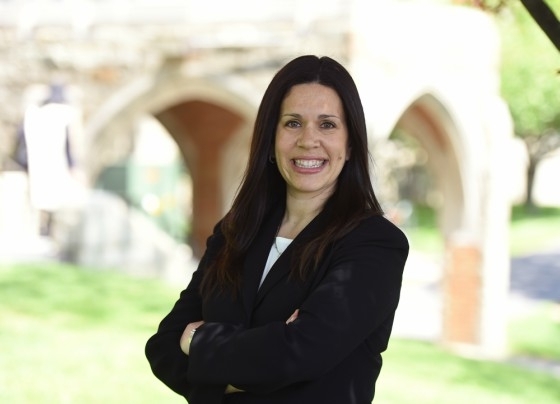
Any attorney who practices in the New York City courts knows that they can be as crowded and noisy as the Big Apple itself.
The chaos usually didn’t bother Assistant Director of Career Development Melissa Kubit Angelides, who made frequent court appearances during her years as a litigator in private practice. But, she admits, there was one particularly busy court date when she just about lost it.
“I always got to court early so I could let the clerk know that I’m a deaf attorney, identify my case, and ask her or him to wave to me when it was called,” she says. “It was a simple request for an accommodation, and most clerks were happy to comply. But, that day, the clerk looked at me and said that it wasn’t his problem to deal with, and that I should have arranged for a sign language interpreter if I couldn’t handle things on my own.”
Angelides advocated for her client successfully without the clerk’s assistance, though the experience still sticks with her. “One of the biggest challenges I face as a deaf attorney is the assumption that I can’t possibly be as capable as—or more capable than—a hearing attorney,” she says. She’s been pushing back against these kinds of assumptions her whole life.
“I was born profoundly deaf and my parents got the official diagnosis when I was nine months old,” Angelides shares. “My mother has always been my biggest advocate and, when I was young, she fought to get me the services and accommodations I needed to be on an equal playing field with my peers. With her example through the years, as I got older, I was able to advocate for myself.”
After graduating from college with the highest academic honors, Angelides set her sights on law school. “I wanted to be an advocate for people who needed someone to lend a voice on their behalf,” she says. As she made her way into the legal profession, she connected with other deaf and hard of hearing attorneys, and eventually got involved with the Deaf and Hard of Hearing Bar Association (DHHBA).
The nonprofit organization of deaf, hard of hearing, and late-deafened attorneys, judges, law school graduates, law students, and legal professionals works to promote and support the advancement of people with hearing disabilities in the legal profession. “I’m so proud to be a DHHBA member,” says Angelides, who furthers the group’s mission by volunteering to educate attorneys, judges, hospital administrators, and doctors about the communication needs of people who are deaf and hard of hearing.
With that great pride, Angelides recently joined 11 other DHHBA member attorneys as they were sworn in and admitted to the Bar of the United States Supreme Court. “It was very moving to pass under the courthouse architrave emblazoned with the words ‘Equal Justice Under Law,’” she says. “The courtroom and ceremony were breathtaking. We had sign-language interpreters and real-time translation on our electronic devices. After a colleague presented us for admission, Chief Justice John G. Roberts, Jr. used American Sign Language to grant the motion and proclaim that we would be admitted. My parents were there and we were all overcome with emotion at the magnitude of the event.”
Angelides now brings her unique perspective on, and experience in, the legal profession to her work with St. John’s Law students. “I’m thrilled to support our wonderful, hardworking, and inspiring students every day,” she says. “And I hope that I can inspire them to not give up on their dreams just because their path may be different than others.”
Related News
Exploring Law and Religion in Global Context: A Month with the Mattone Center
For 15 years, the Denise ’90 and Michael ’91 Mattone Center for Law and Religion has been a vibrant forum for exploring the intersection of law and religion across domestic, international, and...
Writing the Next Chapter: JCRED Alumni Return as Student Advisors
Looking back, Makousse Ilboudo ’16 says the Journal of Civil Rights and Economic Development (JCRED) was where theory met purpose. It gave her a space where she could engage with real-world issues...
St. John’s Community Comes Together to Offer Legal Guidance to Low-Income New Yorkers
Ruth Calaman ’98 was excited to return to St. John’s Law, where she once dreamed of becoming a criminal defense attorney for people who couldn’t afford legal representation. Though her career path...
